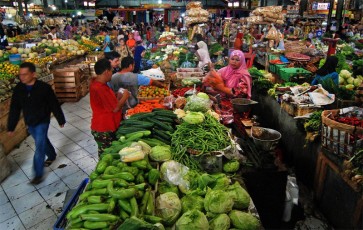Popular Reads
Top Results
Can't find what you're looking for?
View all search resultsPopular Reads
Top Results
Can't find what you're looking for?
View all search resultsVolatile food prices surge 8.47 percent ahead of Ramadan
This upswing, the highest since September 2022, is attributed to escalating costs of rice, red chilies, eggs, poultry, cooking oil and other commodities.
Change text size
Gift Premium Articles
to Anyone
I
ndonesia faces a significant surge in volatile food prices with an 8.47 percent year-on-year (yoy) increase in February as the country approaches Ramadan.
This upswing, the highest since September 2022, has been attributed to escalating costs of commodities including rice, red chilies, eggs, poultry and cooking oil, according to new data released by Statistics Indonesia (BPS) on Friday.
This comes after Bank Indonesia (BI) on Feb. 22 reaffirmed its commitment to curbing inflation and stated its intention to keep the annual increase for volatile food prices below 5 percent.
The headline inflation figure remains safely within BI’s target range at 2.75 percent in February, even though that marks a slight uptick from the consumer price index (CPI) growth of 2.6 percent logged in January, Friday’s data show.
“Rice accounts for the largest share of inflation,” BPS production statistics undersecretary M. Habibullah said during a media briefing accompanying the data release on Friday.
Read also: Govt focuses on volatile food prices in inflation fight

















